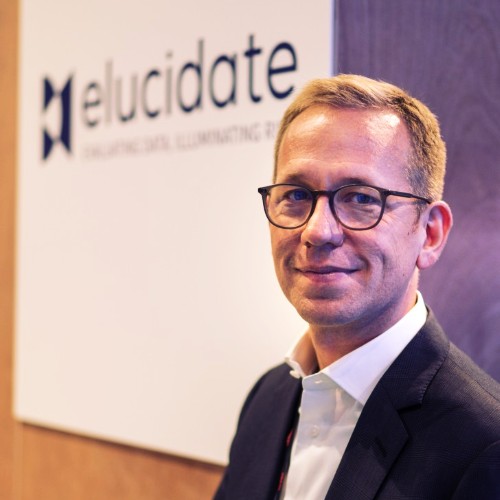1. Please tell us a bit about yourself, both at work and leisure.
I spent most of my career in diplomacy with the United Nations and in finance (spread between London, Zurich and Singapore) and, as such, the shift to a FinTech start up has been both challenging and liberating. The cultural and operational contrast between a bank and Elucidate could not be more extreme, but for me it has been deeply satisfying to build a dynamic team and a product that transcends the capabilities of any one person or function.
I live in Berlin, which is a fantastic FinTech hub and offers a great quality of life. In my spare time I enjoy cycling and spending time outside of the city…perhaps harkening back to my upbringing in rural Ohio in the US.
2. Which product or service do you offer, and who are your competitors?
At Elucidate we use risk modelling and machine learning to quantify and predict financial crime risk. The RegTech/Compliance vertical is a crowded one, but the processes within regulated entities that we seek to replace are largely manual ones such as risk assessment and enhanced due diligence, so we don’t compete with many other technology providers. That said, Scope Ratings in New York is also doing some really interesting work and demonstrating financials crime risk can be quantified and scored at scale.
We firmly adhere to the view that financial crime is a multi-metric phenomenon that requires extended data analysis across our users’ entire universe of data and beyond. This approach differentiates us from some of the more narrowly targeted solutions in the market.
3. How did you get the business idea and take it from launch to the first customers?
The genesis of the company is rooted in the frustration we felt with the way in which banks analyse financial crime risk of themselves and their counterparties. Despite spending 3% of revenue per year for over 20 years on managing financial crime risk, large banks continue to find themselves in scandals. Several of our team tried to solve this problem from the inside, and eventually realised that it cannot be solved by any single market participant. A tool that leverages data from across market participants, and uses that data to learn and evolve, is the only feasible means of detecting, preventing, and ultimately predicting financial crime.
We therefore set about to build the Elucidate FinCrime Index, a deep tech platform which uses data from financial institutions to quantify financial crime risk. Given that Danske Bank’s share price went down by half following their money laundering scandal, the market clearly wants to put a value on financial crime risk. By delivering an applicable set of metrics that measure financial crime, we were able to go from launch to our first users, including three of the top-ten global financial institutions, within less than six months. Enterprise sales is never easy, but this has been as close as one could hope to pushing on an open door. Ours appears to be an idea whose time has come.
4. How have you financed your startup? Any lessons would you like to share from the fund-raising journey?
For the first two years we bootstrapped. It has not been luxurious, but it has forced us to be lean and focused, which has been great. It has also allowed us to build a collaborative culture where engineering, product and sales work hand-in-glove.
Our growth has gotten to the point, though, where outside investment makes sense. We are about to close a financing round with a fantastic group of investors who bring us a range of complimentary skills and experience.
The key lessons for me from fundraising were to be patient and keep it in perspective. It is amazing how quickly fundraising can take over a Founder’s time. The reality is that raising financing takes time and at some point intensive focus on it begins to have diminishing returns. The best way to raise external financing is to show strong traction, so that should be the priority.
5. Which are the key trends and opportunities in (European) financial services?
This has changes a bit in the last few months, but what has not changed is the drive within financial institutions to push forward with digitisation and automation. We see a stronger focus on cost at the moment, which for us works but appears to be hurting others. We also see an increasing openness to external and cloud-based solutions, rather than the old-fashioned, costly on-site deployments.
6. What’s on your bookshelf/ reading list?
I intend to tackle Thomas Piketty’s new book, Capital and Ideology, this summer. But for lighter lockdown reading whilst raising a financing round, I fancies a re-read of The Pleasures and Sorrows of Work by Alain de Botton.
7. Your favorite place for a coffee and/ or a drink?
Coffee at Climsons on Broadway Market in London, Drinks at the Monkey Bar on top of the 25 Hours in Berlin.

